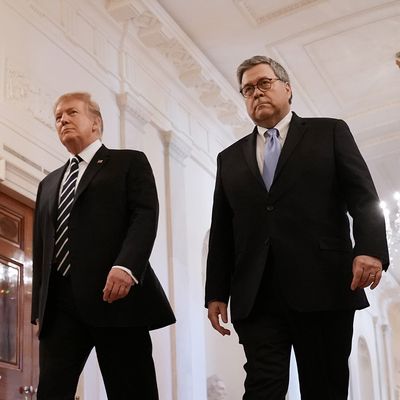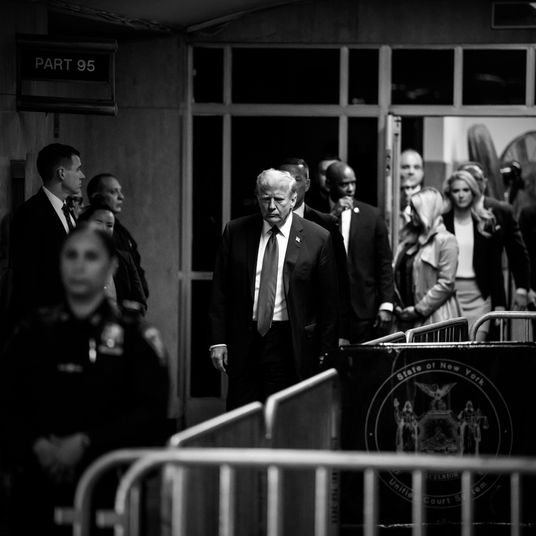
In May of 2016, shortly after Donald Trump had wrapped up his party’s nomination, but when the notion he might win the presidency seemed remote at best, Benjamin Wittes wrote one of the very early essays attempting to analyze how an obviously authoritarian president might abuse his powers. “The soft spot, the least tyrant-proof part of the government, is the U.S. Department of Justice,” he argued, laying out how prosecutorial discretion could allow a president to harass his domestic enemies.
Yesterday’s news that the Department of Justice is exploring yet another probe of James Comey, the former FBI director turned Trump antagonist, would seem to confirm those fears have been borne out.
As the Times report notes, the investigation — the second the Department of Justice has brought against Comey — is highly unusual. The charge is that, in 2017, Comey leaked to the Times and Washington Post details of a dubious Russian document that the bureau had acquired in 2017. The document claimed Attorney General Loretta E. Lynch had assured the Clinton campaign that the FBI would not investigate the email scandal very deeply. The authenticity of this fact has never been established, and some members of the bureau suspect it was Russian disinformation, designed to discredit the FBI and stoke suspicion about Clinton’s corruption. But the memo’s existence made Comey paranoid about the appearance of favoritism toward Clinton, and helped push him toward his fateful decision to announce a reopening of the email probe days before the election — a decision that likely swung the election to Trump.
Leaking details of FBI investigations to the media is illegal. Prosecution, however, is rare, and it is even more rare — possibly unprecedented — to prosecute leaks that occurred several years ago. So Comey is not being hit with trumped-up charges. He is the apparent victim of selective prosecution.
No single case is egregious enough to prove bias on its own. The pattern of selective prosecution under Trump’s Department of Justice, and his fanatically partisan Attorney General William Barr, has become evident in a series of cases that all resemble this one. The connecting thread is that Trump’s enemies are scoured for any violation that can be found, and held to the strictest letter of the law, while his allies are given broad latitude.
Enough cases fit the pattern for it to have become unmistakable. The Department of Justice has conducted several reviews of the Mueller investigation. The last one, conducted by Inspector General Michael Horowitz subjected its FISA warrants of Trump’s staffers to strict oversight, finding several errors. The problem is that the public had little basis of comparison to measure the errors — were they egregious, as Trump suggests, or ordinary sloppiness? Nobody knows what the ordinary level of sloppiness is, because FISA warrants don’t normally come under intense public scrutiny.
Meanwhile, Barr has appointed John Durham to undertake another even broader investigation into the FBI and the intelligence community’s Russia investigation. The probe appears to be aimed at other Trump antagonists, such as former CIA Director John Brennan. Barr has thrown his weight behind the probe, visiting foreign countries and asking their cooperation.
The Department has also pursued a case against former director Andrew McCabe for misleading the Department about media leaks. McCabe is another Trump target, who stood behind Comey after Trump fired him, has since then been the target of public and private abuse by the president. The potential charges have been hanging over McCabe’s head for so long that last month a court ordered the Department either to bring a case or drop it.
In theory, there would be nothing wrong with the Department of Justice tightening up its standards of conduct. But all the evidence points to the conclusion those standards are being raised only for Trump’s political enemies. The Department released batches of private texts by Lisa Page, including texts that had no political relevance, exposing her to personal embarrassment. Trump of course is the head bully, mocking Page repeatedly, including engaging in a simulated orgasm between her and the FBI agent with whom her affair was exposed in the texts. Page is suing the Department, but the Department is not bringing its own charges against the officials who undertook this obvious abuse.
Nor is the Department investigating the ubiquitous 2016 leaks about the Clinton email probe.The sentiment against Clinton among conservative FBI agents was at such a fervor that agents would openly cheer on colleagues investigating her with comments like “You have to get her” and “You guys are finally going to get that bitch.” They pressured Comey to bring charges by leaking constant stories to the right wing media. “FBI agents say the bureau is alarmed over Director James Comey urging the Justice Department to not prosecute Hillary Clinton over her mishandling of classified information,” stated a report in the Daily Caller. Giuliani was literally broadcasting his leaks from conservative agents on television.
This history is relevant for two reasons. First, those leaks were far more historically significant than any of the leaks that are currently being investigated. The anti-Clinton cabal was trying to force Comey to violate DOJ protocol and announce an investigation of a candidate leading up to an election, and they succeeded.
Second, the flagrant nature of the 2016 anti-Clinton leaks show just how unseriously the bureau has taken its rules on leaking. The behavior was so common precisely because everybody on all sides assumed the prohibition would never be enforced, which is what makes the new selective enforcement of strict anti-leaking protocol so obviously biased. It would be as if every car in Washington, D.C., driving even one mile over the speed limit was suddenly pulled over and subjected to the maximum penalty allowed by law.
Trump is not arbitrarily having his opponents arrested. He is doing something more subtle, but still extremely dangerous: using the Department of Justice to selectively hold his opponents to the most exacting levels of legal scrutiny that are not broadly applied. It doesn’t even matter that not every investigation brings charges, and the charges themselves probably won’t hold up in court. The time, expense, and reputational cost of the investigations will be damaging enough.
Wittes’s 2016 warning was chillingly prescient on this score. “A prosecutor — and by extension, a tyrant president who directs that prosecutor — can harass or target almost anyone, and he can often do so without violating any law,” he wrote. “He doesn’t actually need to indict the person, though that can be fun.” It’s easy to see how even honest figures — as Durham is reputed to be — can be brought along into this corrupt pattern. Each one is directed to investigate a single case. They’re not charged with determining whether the law in question is being applied in a broadly consistent manner, only whether it was violated in a single instance.
The message Trump has sent to his bureaucracy is unmistakable. Political loyalists will be granted broad latitude, and displays of troublesome independence will be held to the strictest accountability. Fascism is not descending on Trump’s America, and the rule of law has not disappeared. But its slow disintegration has crossed a dangerous threshold.






























